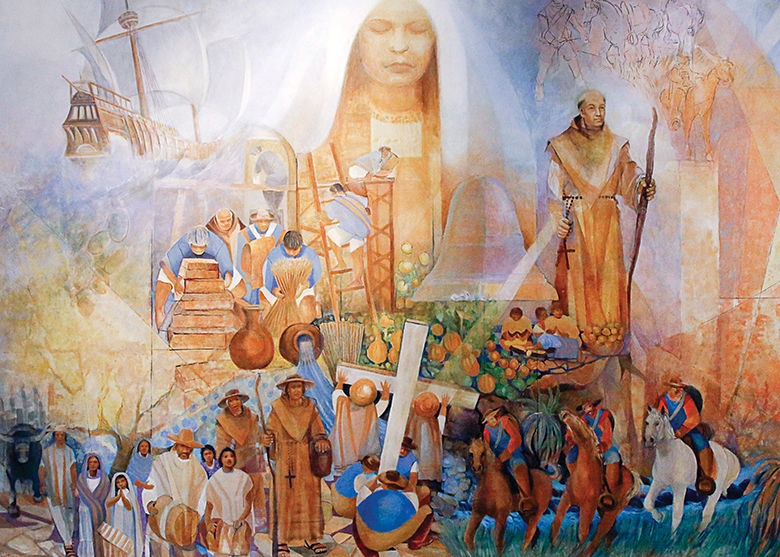As I write to you this week, I am on my way to Washington, D.C. and Philadelphia to take part in the World Meeting of Families and Pope Francis’ pastoral visit to our country.
I am excited for the pope’s five-day pilgrimage, which will bring him to Washington, New York and Philadelphia, Sept. 22—27. It will be the pope’s visit to our country and in some ways he will be making history.
Francis is the first pope from the New World, the first pope from the Americas. And he will be the first head of the world’s Roman Catholic Church to address Congress, when he speaks there on Sept. 24.
But for me, the most important moment is going to be his canonization of Father Junípero Serra the day before that, on Sept. 23. I am honored to be concelebrating at that canonization Mass, along with several of my brother priests from the Archdiocese of Los Angeles.
Francis has rightly called Father Serra “one of the founding fathers of the United States.”
His visit this month will take him to Washington, New York and Philadelphia — the traditional “birthplaces” of U.S. government, economy and culture. But Francis knows this country’s roots run deeper.
In the standard narratives, American history starts in the 1600s with the English settlers at Jamestown and the pilgrims at Plymouth Rock. But a century before that, missionaries and explorers from Spain and Mexico were already evangelizing the territories of what is now Florida, Texas, California and New Mexico.
Hispanic Catholics left the marks of their language and faith on the nation’s landscape, especially here in California and the American Southwest — Santa Fe (“Holy Faith”), Sacramento (“Holy Sacrament”), the Sangre de Cristo Mountains (“Blood of Christ”), San Francisco (“Saint Francis”).
Los Angeles, as we know, was first known as El Pueblo de Nuestra Se√±ora de los Angeles de Porciuncula (“The Town of Our Lady of the Angels of Porciuncula) — named by Father Serra’s associates for the little chapel where St. Francis first heard the call of Jesus.
The pope took his name from St. Francis and he knows this history. It is fitting that history’s first Hispanic pope will give the United States its first Hispanic saint and its first saint to be canonized on American soil.
In lifting up a son of St. Francis, the pope is seeking to inspire Americans to rediscover the nation’s Hispanic and Christian foundations — at a moment in our history when these foundations are being challenged.
America’s founders, among them Father Serra, laid the spiritual and intellectual groundwork for a nation that remains unique in human history — conceived under God and united in a commitment to universal human dignity, freedom and the flourishing of a diversity of peoples, races and beliefs.
In recent years, Americans’ commitment to this vision has wavered. We see this in the divisive debates over immigration.
I expect that Francis will challenge our national conscience and remind us of the mounting human toll resulting from our failures of political will.
As an immigrant’s son — his father fled fascism in Italy to settle in Argentina — Francis knows that the immigrant spirit is always a source of renewal and innovation. He will no doubt appeal to Americans’ sense of hospitality and justice and call us to reclaim our roots as a nation of immigrants and a refuge for the world’s downtrodden.
I also expect that the pope will strongly challenge the aggressive secularization and “de-Christianizing” of American society and culture.
This is perhaps the most disturbing sign for our nation’s future — the increasing hostility against Christian institutions, the vilifying and even criminalizing of Christian beliefs by the elites who shape American life in the areas of law, government, education, popular culture and the news media.
In his speeches to Congress and in Philadelphia, the pope will likely recall our nation’s Christian beginnings and remind us that freedom of conscience and religious faith have always been foundation for America’s civic institutions and commitment to human rights.
With Junípero Serra, the pope is giving Americans a saint who reflects his own spiritual priorities but who was also a pioneer of the American spirit.
Father Serra was a passionate man of prayer and a lover of nature who also possessed fine entrepreneurial instincts and rich practical gifts. He was a preacher of mercy and an untiring defender of the rights of women and the vulnerable. Three years before the Declaration of Independence, Father Serra wrote his own bill of rights for indigenous Californians. He is also probably the first person in the Americas to advance a moral argument against the death penalty.
As he is making history with his first visit to America, Pope Francis will be calling Americans to rediscover their own. Father Serra’s canonization is more than a religious event for Catholics. For Francis it is an invitation for Americans to recover their history and identity — and to embrace the challenge of national spiritual and moral renewal.
So let’s pray for one another and for our country this week. And let’s ask Our Lady of Guadalupe to watch over our Holy Father and make his visit fruitful for the new evangelization of our continent.
You can follow Archbishop Gomez daily via Facebook, Twitter and Instagram.

